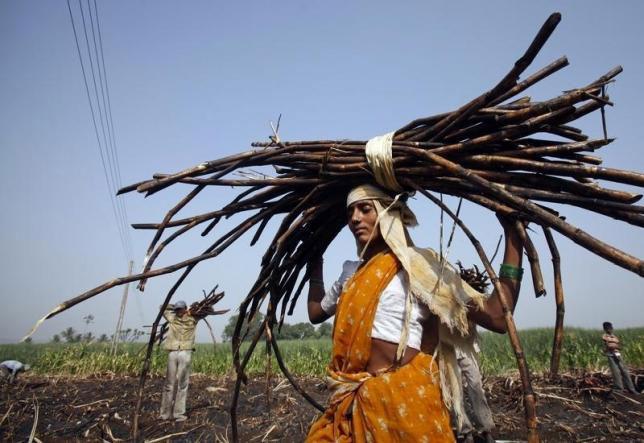
Every year, Bhiwde and other female laborers were sexually assaulted by supervisors and landowners, she said.
After one difficult pregnancy, Bhiwde's husband and his family took her to a doctor, who advised her to have a hysterectomy to prevent any further complications.
"The doctor said, 'let's take it out'," Bhiwde said by telephone from her village in Beed district.
"He said, it'll only cause trouble."
Female workers in western Maharashtra's sugarcane fields routinely face abuse and rape by landlords and middlemen who enslave them through debt bondage, activists say.
Israeli woman says gang-raped in Indian resort town
They said women are often forced by their families to undergo sterilisation or a hysterectomy so they do not get pregnant from the repeated abuse, and can work without a break.
"It is an unimaginable violation," said Nirja Bhatnagar, regional manager at ActionAid in Mumbai, which has surveyed dozens of female sugarcane cutters in Beed district.
"There is no human rights violation worse than having to remove your uterus so you can enter an informal economy that does not care for you," said Bhatnagar.
However, a spokesperson for the sugar factories' cooperative denied that women are abused.
"We have not heard of any such instances," said Sriramji Shete, a vice chairman of the Maharashtra State Co-operative Sugar Factories Federation.
"If they are unhappy with the wages or the conditions, why would they keep coming back?" he told the Thomson Reuters Foundation.
 Workers fill bottles with Alta, a red dye which Hindu women apply with cotton on the border of their feet during marriages and religious festivals, at a workshop in Kolkata, India, August 2, 2016. PHOTO: REUTERS
Workers fill bottles with Alta, a red dye which Hindu women apply with cotton on the border of their feet during marriages and religious festivals, at a workshop in Kolkata, India, August 2, 2016. PHOTO: REUTERSIndia is the world's second-largest sugar producer. In Maharashtra, India's top producing state, about 500,000 rural poor migrate to Beed, Solapur, Kolhapur, Sangli and Satara districts every year to cut sugarcane.
The workers are hired as couples. Most are in debt bondage, receiving about 50,000 to 60,000 rupees ($745 to $895) from a middleman as an advance against working for six to eight months.
At the end of that period, the workers are often told they still owe money, and that they must return the next season, activists say.
'Resigned to their fate'
During the harvesting season, which runs from November to May, migrant workers erect flimsy shacks of straw and plastic to live in. There is no running water, electricity or toilets.
India's first female Uber driver found dead in Bengaluru
The cutter couples, sometimes accompanied by their older children, work from about 4 a.m. to late afternoon. They then carry heavy loads of sugarcane and stack them in carts drawn by bulls that take them to the factories for crushing.
There may be a doctor to tend to cuts and injuries, but workers must take care of major illnesses - and pregnancies, campaigners said.
Child labor is rampant, and because only couples are hired, girls are married before the legal age of 18, said an activist who works in Satara.
The women often suffer miscarriages and those with children are told that sterilization or a hysterectomy is the only fix, she said.
"It is the worst form of slave labor, and women suffer the brunt of it," said the activist who spoke on condition of anonymity as she did not want to get the workers in trouble.
"You can't really blame the family - they are resigned to their fate. They know there is abuse, but they know they must work," she said.
ActionAid's Bhatnagar and the activist said they had met doctors who perform hysterectomies. The procedure costs about 35,000 rupees ($525), and sink the poor family further in debt.
The women are generally unaware of the risks of doing hard manual labor soon after the surgery, and the effects of the procedure at a young age, they said.
India's first female fighter pilots pave for more women in combat
Calls to a doctor in Beed went unanswered.
Unionising the workers may give them a voice and some protection, but these efforts are opposed by the sugar lobby, with many factories owned by wealthy politicians, activists say.
"There are laws against bonded labor and against abuse, but these are poor, low-caste workers who are afraid of the higher-caste owners," said Flavia Agnes, a co-founder of women's rights organization Majlis in Mumbai.
"They have to go back to the same fields to work. They have no option," she said.



1725030039-0/Untitled-design-(2)1725030039-0-165x106.webp)
1725366721-0/kyle-(1)1725366721-0-165x106.webp)



1732707402-0/Untitled-design-(8)1732707402-0-270x192.webp)








COMMENTS
Comments are moderated and generally will be posted if they are on-topic and not abusive.
For more information, please see our Comments FAQ